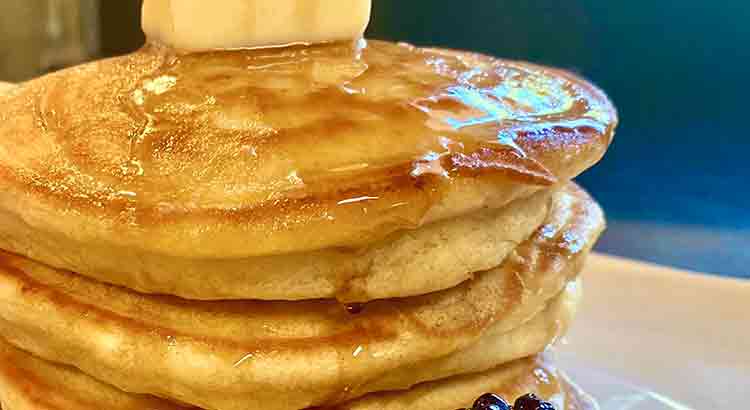Pancakes are a breakfast staple, and there’s nothing quite like biting into a stack of fluffy goodness. But if your pancakes are lacking that airy texture you crave, it’s time to troubleshoot and make some adjustments to your pancake-making routine. We’ll uncover some common mistakes that could be causing your pancakes to be dense and show you how to fix them.
The most common reason why pancakes are dense is overmixing the batter. When the batter is overmixed the gluten network gets overdeveloped, which will make the pancakes thought and dense.
So, let’s dive in and discover how to banish dense pancakes from your kitchen and create a pancake paradise. Get ready to enjoy light, airy, and utterly delicious pancakes that will have you reaching for that maple syrup with a smile. Let’s make your pancake dreams come true!
1. Overmixing the Batter
When it comes to making pancakes, it’s important not to overmix the batter. Overmixing can lead to tough and dense pancakes instead of the light and fluffy ones we all love. When you mix the batter, it’s natural to want to make sure all the ingredients are well incorporated, but be careful not to go overboard.
Overmixing causes the gluten in the flour to develop too much, resulting in a tougher texture. To avoid this, gently stir the dry and wet ingredients together just until they are combined. It’s okay if there are a few lumps in the batter. Remember, a little bit of mixing goes a long way when it comes to making light and airy pancakes.
2. Using the Wrong Flour Type
The type of flour you use can also greatly impact the density of your pancakes. All-purpose flour is the most commonly used flour for pancake recipes, but using the wrong flour can lead to dense results. Different flours have different protein contents, which affects the structure of the pancakes.
If you’re using a flour with a higher protein content, such as bread flour, your pancakes may turn out dense. This is because the higher protein content leads to more gluten formation, resulting in a tougher texture. On the other hand, cake flour has less protein, which can make pancakes more tender and lighter. Stick to using all-purpose flour or a pancake mix specifically formulated for light and fluffy pancakes to achieve the desired texture.
3. Using Too Much Liquid
Another reason your pancakes may end up dense is if you use too much liquid in the batter. Pancake batter needs to have the right consistency to create fluffy pancakes. If the batter is too thin, it will spread too much on the griddle or pan, resulting in thin and flat pancakes. On the other hand, if the batter is too thick, it won’t spread enough, and you’ll end up with dense and heavy pancakes.
To avoid this, follow the recipe measurements carefully and add the liquid gradually. Start with the recommended amount and then adjust as needed. The batter should be thick enough to hold its shape when poured onto the cooking surface but still be pourable. By getting the right balance of liquid in your pancake batter, you’ll achieve pancakes that are light and airy.
4. Cooking on a Low Heat
The temperature at which you cook your pancakes can greatly affect their density. If you cook them on a low heat, they will take longer to cook through, and the longer cooking time can result in denser pancakes. Additionally, cooking on low heat can cause the pancakes to absorb more butter or oil, making them greasy and heavy.
To fix this, make sure your griddle or pan is preheated to the correct temperature before adding the batter. Medium heat is usually ideal for cooking pancakes. This allows them to cook evenly and quickly without becoming too dense. If your pancakes are browning too quickly on the outside but still raw on the inside, reduce the heat slightly. Finding the right balance of heat will help you achieve pancakes that are golden on the outside and light on the inside.
5. Flipping the Pancakes Too Early
Timing is crucial when it comes to flipping pancakes. Flipping them too early can cause them to deflate and become dense. It’s important to wait until you see bubbles forming on the surface of the pancake before flipping it. These bubbles indicate that the bottom side is cooked and ready to be turned over.
Resist the temptation to peek or press down on the pancakes while they’re cooking. Let them cook undisturbed until you see those bubbles, and then gently flip them using a spatula. This will ensure that the pancakes have the chance to rise and become fluffy. Patience is key when it comes to flipping pancakes, and it will pay off with light and airy results.
6. Using a Bad Leavening Agent
The leavening agent you use in your pancake batter can significantly impact the texture and fluffiness of your pancakes. Baking powder is commonly used as a leavening agent in pancake recipes because it helps the batter to rise and creates those delightful air pockets that make pancakes light. However, using old or expired baking powder can lead to dense pancakes.
If your pancakes consistently turn out dense, it might be time to check the freshness of your baking powder. Baking powder loses its effectiveness over time, so it’s essential to use a fresh and active one. To test the potency of your baking powder, you can add a small amount to a cup of hot water. If it fizzes and bubbles vigorously, it’s still good to use. Otherwise, it’s time to replace it with a fresh batch. By using a good and active leavening agent, you can ensure that your pancakes rise beautifully and have that desirable fluffiness.
7. Not Allowing the Batter to Rest
Resting the pancake batter might seem like an unnecessary step, but it can make a significant difference in the texture of your pancakes. Allowing the batter to rest for a short period before cooking gives the ingredients time to hydrate and the gluten in the flour to relax. This resting period helps create tender and fluffy pancakes.
After preparing the pancake batter, let it sit for about 10 to 15 minutes before cooking. During this time, you may notice that the batter thickens slightly. This is perfectly normal and allows the flour to absorb the liquid fully. The rested batter will produce pancakes that are lighter and more tender. So, be patient and give your batter that little bit of time to rest before you start cooking. The improved texture will be worth the wait.
Final Thoughts
Making light and fluffy pancakes is a delightful art that can be mastered with a little practice and attention to detail. By avoiding common mistakes like overmixing the batter, using the wrong flour type, using too much liquid, cooking on low heat, flipping the pancakes too early, using a bad leavening agent, and not allowing the batter to rest, you can ensure that your pancakes turn out perfectly every time.
Remember, pancake making is all about finding the right balance. Don’t overmix the batter or use a flour with too high of a protein content, as these can lead to dense pancakes. Be mindful of the amount of liquid you add, as it can affect the consistency and fluffiness of the batter. Cooking on medium heat ensures even cooking and prevents greasiness, while waiting for the right moment to flip the pancakes allows them to rise and become fluffy.
By following these tips and tricks, you’ll be able to enjoy stacks of light, fluffy, and utterly delicious pancakes. So, gather your ingredients, preheat your griddle, and get ready to impress your family and friends with your pancake prowess. With a little patience and practice, you’ll be flipping perfect pancakes that will make breakfast the best meal of the day!

